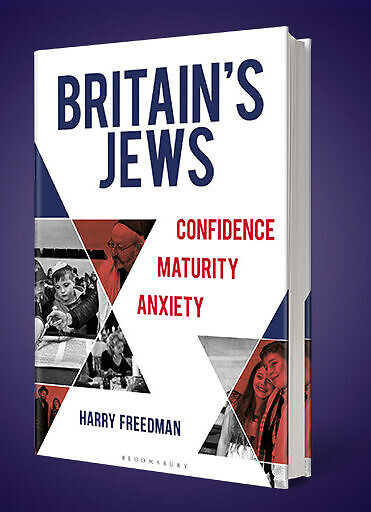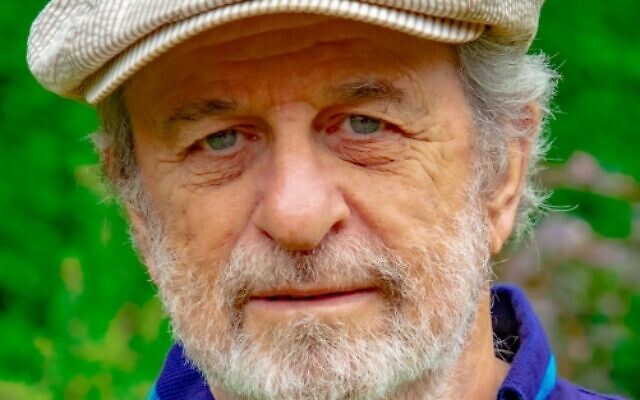What makes UK Jews tick today?
Harry Freedman's new book is a snapshot of Jewish life in Britain
Jenni Frazer is a freelance journalist
Just over 30 years ago, Stephen Brook published a book called The Club, a warts-and-all picture of British Jewry.
Fast forward to a meeting two years ago between writer Harry Freedman and his publisher — the same publisher responsible for The Club. The publisher thought it was time for a new version. Freedman said: “I won’t do a sequel to The Club, because things have moved on. But I will do something — and I will do it my way”.
He began writing during the pandemic, but admits Britain’s Jews: Confidence, Maturity, Anxiety, was a hard road, not least because of the constant updating necessary. Instead, he says: “I have produced a snapshot of what Jewish life in Britain was like when I started to write”.
Freedman is a veteran of Jewish communal life. Not only is he a former chief executive of the Masorti movement, but he has written several books about Jewish life and thought, ranging from investigations into the Talmud and Kabbalah, to a portrait of Rabbi Louis Jacobs and — most recently — an examination of the Jewish influences in the songs of Leonard Cohen.
But trying to present a definitive picture of Jewish life in 21st century Britain is a big ask, and Freedman agrees that it was a bit like trying to nail blancmange to a wall. He had, after all, a huge cast of characters and his research covered nearly 100 interviews. He writes: “There are many Jews in Britain doing remarkable things, and many more whose stories are worth telling. I couldn’t speak to them all: I’d have ended up with an encyclopaedia, not a book”.
Those who are in the flow of Jewish communal life may not believe things move very fast, but Freedman says there were many changes he had to make — people changed jobs, organisations closed down, and, sadly, people died.
 Just the same, Britain’s Jews is an engrossing and engaging read, whether you are involved in the community or just aware of it. And Freedman doesn’t just speak to “the usual suspects”, although he covers his bases well by talking to those who you might expect to be in such a book.
Just the same, Britain’s Jews is an engrossing and engaging read, whether you are involved in the community or just aware of it. And Freedman doesn’t just speak to “the usual suspects”, although he covers his bases well by talking to those who you might expect to be in such a book.
His major takeaway — and the major difference between his book and that of Stephen Brook’s The Club — is that “I come from a generation of Jews who didn’t put our heads above the parapet. We led quiet lives and generally wanted people to leave us alone. What really surprised me [in the writing of this book] was the confidence with which young Jews treat their Judaism”.
Freedman attributes that to a number of factors. “Some of it is about identity — these days everyone has to have an identity —so young Jews are no different, and they are proud of who they are. But importantly, they don’t do things in spite of being Jewish, they do things because they are Jewish — and that’s a real change from the Jewish community that I grew up in.”
He was also impressed by the way in which the issue of antisemitism was being treated, another huge difference from 30 years ago when the topic was barely mentioned. Freedman interviewed people from the Community Security Trust (CST) and Jonathan Boyd from JPR, the Institute for Jewish Policy Research.
“It makes you realise that there are nuances to how we should look at antisemitism — we shouldn’t necessarily feel that we are being completely harassed and that we have no choices. It’s being dealt with in a very good way; and Jon Boyd made the very interesting point, which I put in the book, that more antisemitic incidents are being reported because social media makes it possible to report these things — but overall the level of antisemitic incidents doesn’t seem to be rising”.
After the book went to press, one charity, Tzedek, to which Freedman pays a lot of attention in the book, closed down after 32 years as the Jewish community’s response to extreme poverty around the world. Two other bodies were launched: the London Centre for the Study of Antisemitism, and the National Jewish Assembly, founded by former Board of Deputies vice-president Gary Mond in response to frustration with the apparent political trajectory of the Board.
From his bird’s-eye view of British Jews, Freedman is able to discern a much more voluble left-right split in the community than previously documented. “There is a very strong secular Jewish identity now, which we didn’t always have, versus a very strong Charedi identity, and of course the Charedi population is growing much faster”. To some extent, he says, Covid brought those two sides together as people realised they were obliged to work together to maintain religious life.
On the other hand, he concludes that there is “an increasing split over Israel and I think [we were speaking before the most recent Israeli elections] that that is likely to get worse. There are two very strong pro and anti-Netanyahu camps here.”
Freedman devotes a lot of space in his book to Jewish education. There are many more Jewish schools in the UK than 30 years ago. He talks about people who go to Jewish schools, then to a ‘Jewish’ university such as Birmingham or Manchester, and on to a job in the City, perhaps, where they mix only with other Jews. “What happens when they go out into the world? Jewish education has great advantages and great disadvantages. One of the disadvantages is that it can create ghettoes. But an advantage is that people are more Jewishly literate than previously.”
He is aware, however, that people in cities outside London, who cannot send their children to Jewish schools, have another problem. They try to compensate by setting up chedarim (post-school study) “only to find that there are no teachers because they have all gone to teach at Jewish schools in London”.
The book is a great primer as an introduction to what makes Jews tick today. Freedman expects initial readers to be Jews, “mainly because Jews like reading about Jews”. But he had another audience in mind: non-Jews who are interested in Judaism and are intrigued by what makes us, us. “I hope there is a non-Jewish audience out there who will find things of interest in the book; and I am sure there is a Jewish audience who will challenge everything I’ve said!”

Thank you for helping to make Jewish News the leading source of news and opinion for the UK Jewish community. Today we're asking for your invaluable help to continue putting our community first in everything we do.
For as little as £5 a month you can help sustain the vital work we do in celebrating and standing up for Jewish life in Britain.
Jewish News holds our community together and keeps us connected. Like a synagogue, it’s where people turn to feel part of something bigger. It also proudly shows the rest of Britain the vibrancy and rich culture of modern Jewish life.
You can make a quick and easy one-off or monthly contribution of £5, £10, £20 or any other sum you’re comfortable with.
100% of your donation will help us continue celebrating our community, in all its dynamic diversity...
Engaging
Being a community platform means so much more than producing a newspaper and website. One of our proudest roles is media partnering with our invaluable charities to amplify the outstanding work they do to help us all.
Celebrating
There’s no shortage of oys in the world but Jewish News takes every opportunity to celebrate the joys too, through projects like Night of Heroes, 40 Under 40 and other compelling countdowns that make the community kvell with pride.
Pioneering
In the first collaboration between media outlets from different faiths, Jewish News worked with British Muslim TV and Church Times to produce a list of young activists leading the way on interfaith understanding.
Campaigning
Royal Mail issued a stamp honouring Holocaust hero Sir Nicholas Winton after a Jewish News campaign attracted more than 100,000 backers. Jewish Newsalso produces special editions of the paper highlighting pressing issues including mental health and Holocaust remembrance.
Easy access
In an age when news is readily accessible, Jewish News provides high-quality content free online and offline, removing any financial barriers to connecting people.
Voice of our community to wider society
The Jewish News team regularly appears on TV, radio and on the pages of the national press to comment on stories about the Jewish community. Easy access to the paper on the streets of London also means Jewish News provides an invaluable window into the community for the country at large.
We hope you agree all this is worth preserving.






















